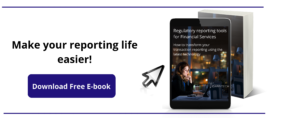
Self-reporting vs assisted reporting vs delegated reporting – what is the difference?
Ever wondered what the difference is between self-reporting, assisted reporting and delegated reporting and which one is right for you? We often get this question regarding EMIR, MIFID II and SFTR reporting. Although we offer assisted and delegating reporting, we still believe there is no one right answer for everyone. As usual, it depends on your business structure, your reporting requirements, and the capabilities of your firm. Let’s take a moment to examine the different transaction reporting alternatives out there.
Self-reporting
Self -reporting or otherwise known as in-house reporting is exactly as it sounds. The financial firm, using in-house personnel, prepares their reports and then submits their trade reports directly to the end point – either an Approved Trade Mechanism (ARM) or Trade Repository (TR).
Self-reporting has several advantages such as building a regulatory reporting framework that fits your exact needs, control over the process, being in first in line for implementation of projects, building in-house team capabilities and knowledge base.
However, the process is time-consuming and extremely expensive. It requires IT infrastructure, adaptation of internal workflows and building of a knowledgeable team that may also be subject to absences or team departures. But one of the biggest disadvantages of reporting in-house is tunnel vision and a lack of understanding of how to deal with non-routine regulatory reporting issues that frequently come up as regulations change.
Before deciding on the self-reporting route, ask yourself the following 6 questions (and probably a lot more):
- Will you be able to report correctly, accurately and in a timely fashion using an internal team?
- Do you have the IT infrastructure to deal with big data and the security you need to protect your data?
- Are you agile enough to incorporate regulatory changes or will you have to wait on your IT team to make the changes you need?
- Does your team have access to collective industry knowledge on reporting best practices or the ability to keep up with changing nuances to existing regulations or learning about new regulations that come into existence?
- Do you have the budget to allocate to building and maintaining your reporting system?
- How will changes to volumes traded affect ARM and TR fees?

Assisted Reporting
Next up on our list is assisted reporting. Here, financial firms decide to engage with a third-party to assist them in their reporting obligation. I must emphasize that your reporting obligation can never be waivered or handed over to another party. The obligation remains yours but the third-party can help you in preparing the reports and submitting the reports to the end point on your behalf. Best practices dictate that you monitor your reporting and any errors that crop up in your reporting you solve together with your vendor.
There are many pros to this type of reporting model. Vendors that offer assisted transaction reporting are dedicated to this service. Unlike doing it in-house, this is not a side task or a distraction from their core business. Every effort is made to create a product and a reporting experience that is tailor-made to the reporting task at hand. This can include harnessing the best technology, access to a greater talent pool that contains regulatory reporting experts that keep you updated on the latest trends and regulations as well as providing on-going support without interruptions. Generally speaking, it is more cost-effective and this type of service provider has the knowledge of the crowd derived from servicing multiple clients. As such, there is no long learning process to implement best regulatory reporting practices.
Possible cons of assisted reporting could lie in continuity of the vendor if they were to go out of business, lack of support and communication from the vendors’ team and less control over the reporting process if the vendor does not provide you with the tools to monitor your reporting first hand.
Before deciding on assisted reporting, ask yourself at least the following 5 questions
- Are you looking for a cost-effective reporting solution?
- Does your vendor offer multiple-regulatory reporting for all your reporting jurisdictions under one roof, so you do not need to engage with multiple vendors?
- How long does the on-boarding process take and is the support team responsive and knowledgeable (both during on-boarding and for the long haul)
- Is the vendor using the latest technology in order to provide you with the best reporting experience? Is the solution scalable and secure?
- What does the vendor offer to make your reporting CAT (correct, accurate and timely) and how does the vendor take the headache out of reporting for you (eg no extra commercial contracts needed with your endpoint, proactive support, an easy dashboard for monitoring, etc).
Delegated reporting
The final one on our list is delegated reporting. Delegated reporting enables one firm to report on behalf of the other party, for example, a bank reports on behalf of their underlying clients. In this scenario, the company is delegating the reporting to counterparties and they automatically submit the counterparty trades to internal or external submission folders at Trade Repositories. Delegation is not relevant to all regulations but regulations such as EMIR and SFTR do allow delegated reporting.
One of the biggest cons of delegated reporting is the lack of transparency the underlying client gets on their submissions and the feedback from the end point on rejected trades or issues. Going back to the point about the ultimate responsibility of the reporting onus falling on the one obligated to report, this can become a fundamental issue. There are assisted reporting vendors that offer delegated reporting dashboards to the client, whereby through a master view dashboard they can review both their own reporting and that of their clients. In turn the underlying client can have their own reporting dashboard to monitor their reporting which eliminates the transparency issue.
Once again, before determining if delegated reporting is right for you, try to answer these 5 questions:
- Does the regulation allow you to use delegated reporting?
- How will you be able to handle reporting for client counterparties?
- Will your underlying clients have transparency on their submissions?
- Do you have an easy way to monitor the reporting for multiple underlying clients and correct any reporting errors in a timely fashion?
- Will you be able to provide submission and connectivity to multiple TRs according to the demand of your underlying clients?
If you are looking for guidance on which reporting model is right for you, feel free to contact us at regulation@cappitech.com.



